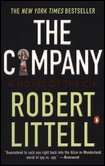Robert Littell's The Company, which is an immensely long (but very readable) novel about the CIA. It follows two generations of spooks who work their way up the chain of command of the CIA, and the major sections of the books track the key events in the Cold War: the Soviet invasion of Hungary, the Bay of Pigs, the Soviet invasion of Afghanistan, and so on.The Company has been highly--and widely--praised: click here for synopses and reviews, and click here for Otto Penzler's opinion of the novel. (His bottom line: "This is nothing less than a stunning historical document.")
Anyway, the part of the novel that is relevant to the question you pose about the debate over habeas corpus has to do with a mole hunt within the CIA. One counter-espionage agent amasses bits of evidence pointing toward one of the main characters, Leo Krinsky, as being a Soviet mole. Krinsky is arrested, brought to the CIA headquarters, and interrogated without a lawyer, and when he professes his innocence (despite the seemingly strong circumstantial evidence against him), the counterespionage agent throws him into a literal dungeon, where the only water source is the toilet. The CIA agent is kept in there for weeks (or was it months?), enduring repeated interrogation. The whole experience is so brutal that when he's finally released, he looks like a shadow of himself, and his hair has turned white.
Considering that the novel was written before the 9/11 attacks and Guantanamo Bay, it's remarkable that Littell captured the essence of the problem of indefinite detention without access to counsel or courts via habeas corpus. If Krinsky were a Soviet mole, national security would call for his isolation so as to prevent damaging national secrets from being passed to the Soviet Union. But what if Krinsky were innocent? The point of habeas corpus is that the Executive Branch--in this novel, the CIA counterespionage agent--isn't the one to make the call as to whether to err on the side of overprotecting national security or overprotecting individual rights; it's for a neutral, third party such as the court to balance the competing concerns.
To listen to Alan Cheuse's review of The Company on "All Things Considered," click here.
Professor Tung Yin joined the University of Iowa College of Law faculty in 2002. After graduating from law school, he clerked successively for the Honorable Edward Rafeedie of the United States District Court for the Central District of California, the Honorable William J. Holloway, Jr., of the United States Court of Appeals for the Tenth Circuit, and the Honorable J. Clifford Wallace of the United States Court of Appeals for the Ninth Circuit. He then spent three and a half years as a litigation associate with Munger, Tolles & Olson LLP in Los Angeles, focusing on employment discrimination cases and white collar criminal defense. He is teaches corporate crimes, national security law, and constitutional law, and has taught federal courts.
For access to his articles, click here.
Professor Yin also runs The Yin Blog ("Law, politics, pop culture, sports, and a touch of Iowa").
Thanks to Tung for a fine suggestion and an especially thorough explanation for his choice.
For earlier suggestions of fiction that illustrates what life is like in societies where the executive can (and must?) jail citizens without judicial review, click here.
--Marshal Zeringue






